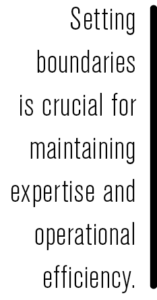Because of their ingrained orientation toward excellent service, real estate agents are often inclined to fulfill every request and commit to every demand from their clients. Nonetheless, setting boundaries is crucial for maintaining expertise and operational efficiency—not to mention one’s sanity. Here’s how real estate professionals can tactfully say “no” at work while still delivering top-notch service.
Understanding when to assert expertise. Clients come to real estate agents for their knowledge of the market, the purchase/sales process and negotiation skills. However, there are occasions when clients might have misconceptions or make requests that don’t align with their best interests. In such instances, it’s a real estate agent’s duty to guide them back on track. This is a good time to address incorrect assumptions and offer a professional assessment of the situation.
 Prioritizing expertise over compliance. Saying “yes” all the time can dilute your expertise. (If all the client wants is a “yes person,” conceivably, they could do everything themselves.) If a client’s request clashes with your professional judgment, asserting your knowledge gently yet firmly is appropriate and perhaps even legally required. It’s important to communicate the potential impact of decisions and steer clients towards more advantageous choices.
Prioritizing expertise over compliance. Saying “yes” all the time can dilute your expertise. (If all the client wants is a “yes person,” conceivably, they could do everything themselves.) If a client’s request clashes with your professional judgment, asserting your knowledge gently yet firmly is appropriate and perhaps even legally required. It’s important to communicate the potential impact of decisions and steer clients towards more advantageous choices.
Maintaining efficiency. Your time is valuable, and it’s essential to manage it effectively. Overcommitting to frivolous or unnecessary tasks can lead to burnout and decrease the quality of your service. When a task falls outside your scope, or there’s not enough bandwidth to take on another project, saying “no” helps you stay efficient and focused on delivering results where it counts. Even if you have an associate who might be able to handle the task, think carefully if completing it will really add value to the transaction; their time isn’t free, either.
Communicating politely and professionally. Saying “no” doesn’t have to be harsh or negative. Explain your rationale clearly, showing clients that your recommendations are in their best interest. A polite refusal coupled with a reasoned explanation reflects professionalism and can often strengthen the client-agent relationship.
Offering alternative solutions. If you must decline a request, try to offer an alternative solution. Suggesting other options or a compromise can help soften the rejection and demonstrate your commitment to assisting the client. This turns a simple “no” into constructive feedback that leads to a productive outcome.
Learning to say “no” is a valuable skill for real estate professionals. It allows you to preserve your expertise, stay efficient, and build stronger, trust-based relationships with your clients. Remember, assertiveness paired with tact and understanding can elevate your professional stature and ensure that you—and your clients—walk away from every transaction satisfied.
Photo: Getty Images/NoSystem images








